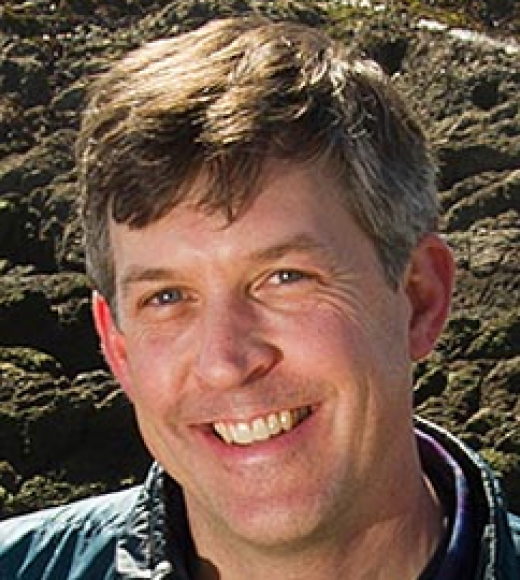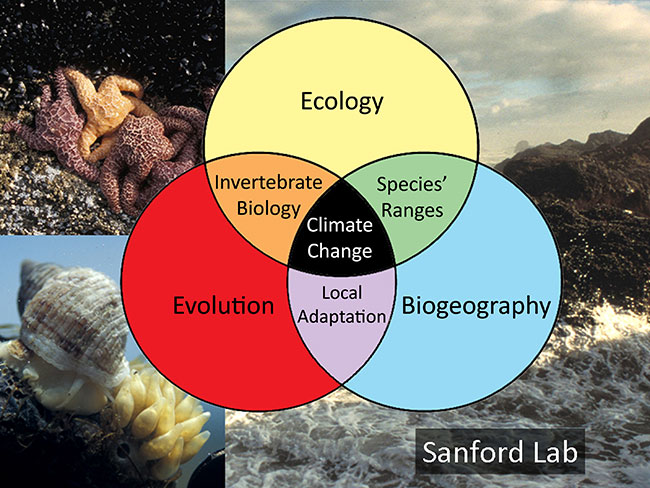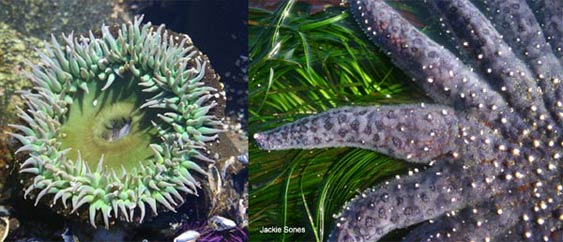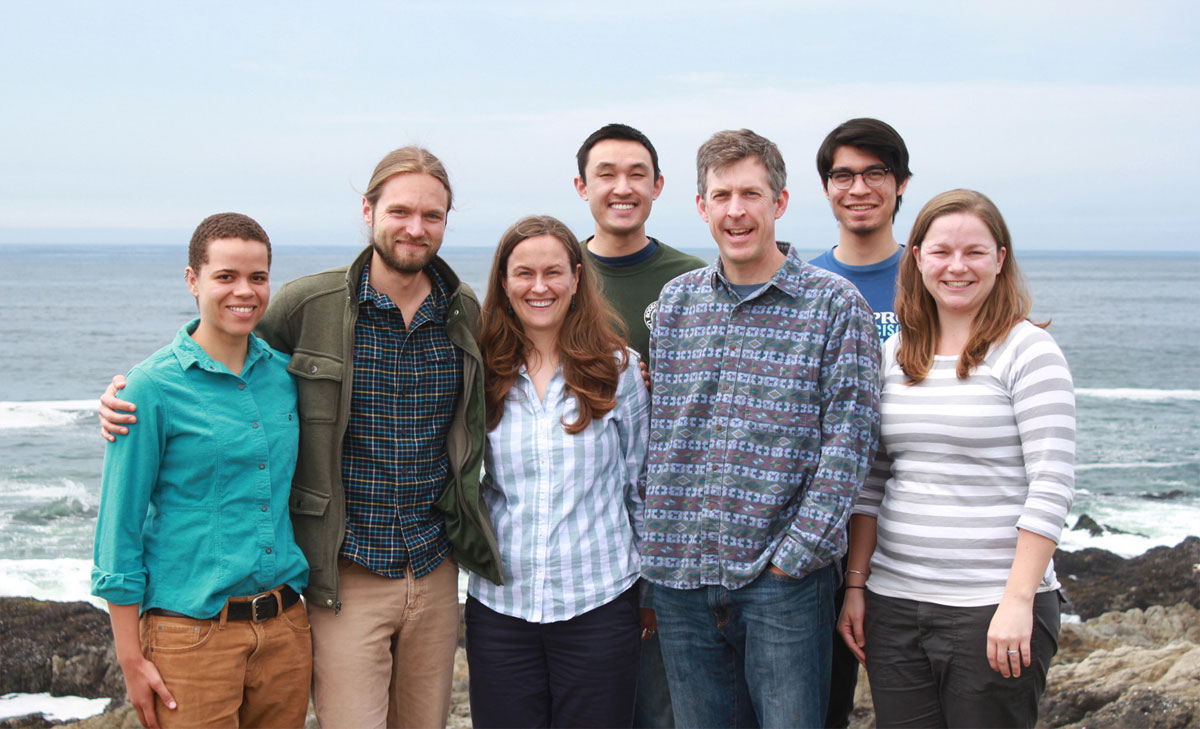
- Bodega Ocean Acidification Research (BOAR)
- College of Biological Sciences
- Sanford Lab
- Evolution and Ecology
University of California Davis, Bodega Marine Laboratory, PO Box 247, 2099 Westshore Rd, Bodega Bay CA 94923
Research | Publications | Teaching | Prospective Students
For more details, please visit the Sanford Lab website.
Research Interests
Climate Change, Biogeography, and Local Adaptation
The Sanford Lab is interested in how marine populations and communities vary in response to both natural oceanographic variation and anthropogenic climate change. Our research seeks to integrate ecology, evolution, and biogeography to understand the processes that shape marine communities: both over large distances along coastlines, and in an era of accelerating climate change. We seek mechanistic understanding of these processes through coordinated field and laboratory experiments centered at Bodega Marine Laboratory. Much of our work focuses on marine intertidal communities, where organisms and their interactions are diverse and easily studied.

Ongoing research projects lie primarily in five areas:
- Local adaptation in the sea
- Eco-evolutionary dynamics
- Geographic range limits
- Ocean acidification
- Invertebrate biology
To learn more, please visit the Sanford Lab website.
Selected Publications
Please email Eric Sanford for pdf reprints.
Sanford, E., J.L. Sones, M. García-Reyes, J.H.R. Goddard, and J.L. Largier. 2019. Widespread shifts in the coastal biota of northern California during the 2014–2016 marine heatwaves. Scientific Reports, doi.org/10.1038/s41598-019-40784-3
Swezey, D.S., J.R. Bean, T.M. Hill, B. Gaylord, A.T. Ninokawa, and E. Sanford. 2017. Plastic responses of bryozoans to ocean acidification. Journal of Experimental Biology 220: 4399–4409.
Kroeker, K.J., E. Sanford, J.M. Rose, C.A. Blanchette, F. Chan, F.P. Chavez, B. Gaylord, B. Helmuth, T.M. Hill, G.E. Hofmann, M.A. McManus, B.A. Menge, K.J. Nielsen, P.T. Raimondi, A.D. Russell, and L. Washburn. 2016. Interacting environmental mosaics drive geographic variation in mussel performance and predation vulnerability. Ecology Letters, doi: 10.1111/ele.12613
Bible, J.M. and E. Sanford. 2016. Local adaptation in an estuarine foundation species: implications for restoration. Biological Conservation 193: 95–102.
Sanford, E., B. Gaylord, A. Hettinger, E.A. Lenz, K. Meyer, and T.M. Hill. 2014. Ocean acidification increases the vulnerability of native oysters to predation by invasive snails. Proceedings of the Royal Society B 281: 20132681
Pespeni, M.H., E. Sanford, B. Gaylord, T. M. Hill, J. D. Hosfelt, H. Jaris, M. LaVigne, E. A. Lenz, A. D. Russell, M. K. Young, S. R. Palumbi. 2013. Evolutionary change during experimental ocean acidification. Proceedings National Academy of Sciences 110(17):6937–-6942.
Kelly, M.W., E. Sanford, and R.K. Grosberg. 2011. Limited potential for adaptation to climate change in a broadly distributed marine crustacean. Proceedings of the Royal Society of London: Biological Sciences Series B, doi: 10.1098/rspb.2011.0542.
Sanford, E. and M.W. Kelly. 2011. Local adaptation in marine invertebrates. Annual Review of Marine Science 3: 509–535.
Sanford, E. and D.J. Worth. 2010. Local adaptation along a continuous coastline: prey recruitment drives differentiation in a predatory snail. Ecology 91: 891–901.
Sanford, E., S.B. Holzman, R.A. Haney, D.M. Rand, and M.D. Bertness. 2006. Larval tolerance, gene flow, and the northern geographic range limit of fiddler crabs. Ecology 87: 2882–2894.
Sanford, E., M.S. Roth, G.C. Johns, J.P. Wares, and G.N. Somero. 2003. Local selection and latitudinal variation in a marine predator-prey interaction. Science 300: 1135–1137.
For more publications, please visit the Sanford Lab website.
Teaching

Teaching on the UC Davis main campus:
EVE 112/112L. Biology of Invertebrates (alternate years) Survey of the major invertebrate phyla focusing on form and function, ecology, and phylogenetic relationships. Are you intrigued by corals, octopus, barnacles, and sea urchins? This is the course for you! (3-unit lecture course; 2-unit lab that emphasizes the study of live animals, 2 field trips)
EVE 101. Introduction to Ecology (alternate years.) A survey of the general principles of ecology. (4-unit lecture/discussion course)
Teaching at Bodega Marine Laboratory:
Note: These courses are offered at the coast each year during Summer Session I. Please consult Undergraduate Courses at BML for the latest details on courses, housing, and applications.
EVE 114. Experimental Invertebrate Biology. Want to learn more about the remarkable diversity of tidepool animals that make their home on the rugged northern California coast? This is the course that you have been looking for! We will cover the biology, ecology, and evolution of local marine invertebrates with a focus on adaptations to environmental and biological factors encountered on the California coast. This course offers hands-on field and laboratory components with an emphasis on testing hypotheses that we generate as a class. Short class projects provide students with practical experience in all aspects of the scientific process including making observations, generating hypotheses, designing experiments, collecting and analyzing data, and scientific writing (3-units lecture/field/lab).
BIS 124. Coastal Marine Research. In this 6-unit course, students pursue independent research projects related to EVE 114 (Experimental Invertebrate Biology). You will receive training and practice in all phases of the scientific process from experimental design to data analysis and science communication (including preparing a final written report and creative filmmaking for a general audience). Must be taken concurrently with EVE 114.
EVE 111. Marine Environmental Issues. This 1-unit course is built around readings and informal discussions related to marine conservation and major environmental issues in coastal waters. Topics include the impacts of climate change, invasive species, and overfishing.
For more details, please visit the Sanford Lab website.
Prospective Students

Interested in joining the Sanford Lab?
I am looking for bright and enthusiastic students who are fascinated by the ecology and evolution of marine organisms. The Sanford Lab offers opportunities for students at all levels.
For more details, please visit the Sanford Lab website.
